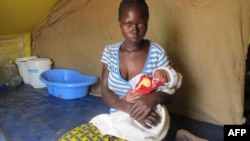The United Nations refugee agency (UNHCR) says instability in the Central African Republic (CAR) is limiting access to hundreds of thousands of internally displaced people and refugees in desperate need of assistance. The UNHCR says human rights violations are rampant and civilians live in constant fear.
The U.N. refugee agency calls the CAR one of the most dangerous places on Earth. It says three months after Seleka rebels ousted the government, the country remains gripped by insecurity and widespread lawlessness.
The UNHCR says it is extremely concerned about the situation of more than 200,000 internally displaced people and more than 20,000 refugees, mainly Congolese and Sudanese, who are unable to receive international assistance.
UNHCR spokesman Adrian Edwards says aid workers have had only limited access to parts of the capital, Bangui, as well as some places in the more remote central and northern parts of the country.
Over the past month, he says the UNHCR and other agencies have conducted assessment missions to Bangui and other areas generally off limits. He says the findings from colleagues are very troubling.
"At least 80 protection incidents have been reported in Bangui involving refugees, among them 10 deaths. There is looting. Refugees in camps and those in Bangui are in fear. Many are traumatized. Many have been the targets of attacks. In areas outside the city, it is more a situation where people effectively are living in the bush and they are coming to towns to get food - whatever they need during the daytime, but then are heading out to hide at night," said Edwards.
Edwards says staff members on these missions have received reports of gross violations of human rights. These include arbitrary arrest and illegal detention, torture, armed robbery, rape and abductions. He says armed groups have burnt down villages and houses in some areas.
He says the mission found schools have reopened in some areas, but remain closed in many others. He says people have limited access to health and basic services and mothers with newborn babies in many areas have no access to medical care.
"Violence against women, girls and boys has also reportedly increased. Humanitarian agencies, under the inter-agency response, have been giving assistance and counseling in some places. We are particularly concerned about the recent arrest of a former government counterpart of ours who worked in Bangui. We are currently seeking information about this person from the authorities, and assurances of his safety," he said.
Edwards says it is extremely difficult to work under these volatile conditions. Nonetheless, he says the UNHCR and its partners are coordinating efforts to assist refugees living in camps. He says they have been able to distribute food to some 11,000 refugees in several camps.
The UNHCR says people continue to flee insecurity in the CAR. It says the total number of refugees from CAR in the region now stands at over 220,000.








